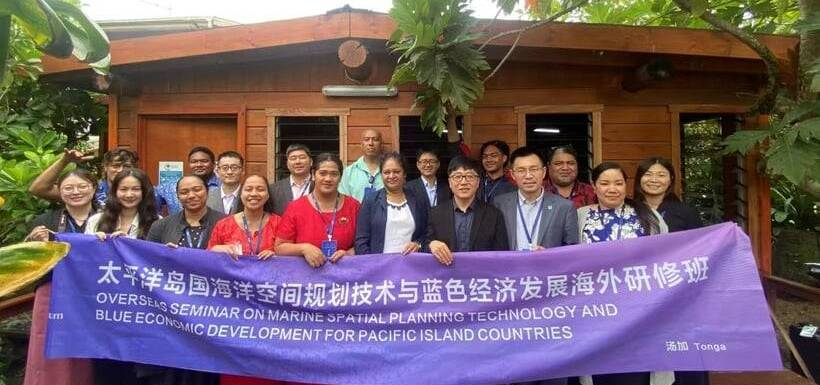News
On November 19, 2021, the 2021 International Forum on Island Ecological Conservation (hereinafter referred to as the Forum), co-hosted by the Island Research Center of the Ministry of Natural Resources and China Ocean Development Foundation (hereinafter referred to as the Foundation), was successfully held online. The Forum was hosted by Feng Aiping, deputy director of the Island Research Center of the Ministry of Natural Resources. Chen Danhong, deputy director of the Department of International Cooperation of the Ministry of Natural Resources, Vincent W. Sumale, minister of Papua New Guinea to China, Pan Xinchun, vice president and secretary general of the Foundation, Zhang Haifeng, director of the Island Research Center of the Ministry of Natural Resources, and Guo Haibo, a doctor of the Department of Marine Island Management of the Ministry of Natural Resources addressed the opening ceremony.
 The picture shows a group photo of some distinguished guests online.
The picture shows a group photo of some distinguished guests online.
More than 350 representatives from China, Papua New Guinea, Fiji, Kiribati, Grenada, Samoa, Sri Lanka, Malta, Denmark (Greenland), the United Kingdom, Canada and other countries attended the online forum, which received nearly 6,000 live streaming views. Twelve experts from China, the United Kingdom, Canada, Denmark, Grenada, Sri Lanka and other countries spoke out freely and expressed their opinions on the topics of "Nature-based island conservation, restoration and management practice", "Island ecological conservation and restoration technology and practice", "Tackling climate change and disaster prevention and mitigation" and "Sustainable island development" etc.
In her speech, Chen Danhong said that China is willing to take joint actions with island countries and regions to implement the relevant goals of the UN for 2030 Agenda for Sustainable Development, and support the UN's initiative "the Ocean Decade" to establish blue partnership. She also came up with three suggestions: First, strengthen policy and planning convergence and promote practical cooperation. Second, expand green cooperation to enhance the resilience of marine sustainable development; Third, reinforce capacity building to improve the ability of island countries to cope with marine disasters and climate change.
Vincent W. Sumale, first of all, on behalf of the embassy of Papua New Guinea, wished the Forum a complete success. He pointed out that the year of 2021 is the 45th anniversary of diplomatic relations between China and Papua New Guinea, and Papua New Guinea is willing to positively respond to the initiative "Building Community of Common Destiny between China and Pacific Islands" put forward by the Chinese President Xi Jinping, strengthen cooperation to jointly cope with challenges such as climate change, adhere to the genuine multilateralism, and maintain international justice and the common interests of developing countries.
Pan Xinchun, on behalf of the Foundation, one of the organizers, extended a warm welcome to the participants. He said that the Foundation is a non-governmental organization committed to pooling Chinese and foreign resources and organizing international efforts to actively carry out comprehensive marine governance, marine ecological conservation, blue economy development, and scientific and technological innovation and application etc, launching close cooperation with many international marine organizations. The Foundation attaches great importance to conducting cooperative research with island countries or countries with islands on issues such as island ecological conservation etc, having carried out active cooperation with the Pacific Islands Forum (including 12 island countries and 2 international organizations) and island countries such as Mauritius, Seychelles, Madagascar, Sri Lanka, East Timor, Indonesia, Malaysia, Bangladesh, Cambodia, Fiji, Antigua and Barbuda in marine ecosystem conservation, blue economy development, marine system construction and sea level monitoring etc.
Pan Xinchun stressed that the Foundation appreciates the marine cooperation with countries that have signed the "Belt and Road" Cooperation Agreement with China. The Foundation has set up the maritime silk road project "Promoting Marine Spatial Planning, Boosting Blue Economic Development" to help the silk road countries including island countries with marine ecological conservation and socio-economic development. The maritime silk road project includes cooperation in marine governance, space planning, blue economy, marine protection, marine science and technology, sea level monitoring, fisheries aquaculture, infrastructure, urban construction, marine culture, personnel training and investment attraction etc, he said. The Foundation has signed bilateral cooperation agreements on maritime silk road project with 18 silk road countries. The Maritime Silk Road Project is funded, supported and coordinated under the leadership of the Foundation, and implemented by the Institute of Maritime Space Planning. Data collection of most countries and the draft of marine spatial planning for one-third of the countries have been completed. Dozens of training courses on ocean management for maritime silk road countries were held. Hundreds of Chinese enterprises have been invited to conduct investment analysis on 18 countries implementing the maritime silk road project, and many of them show investment intentions.
Pan said the maritime silk road project is progressing as planned and making new progress. Under the guidance of Ministry of Natural Resources of People’s Republic of China, the State Oceanic Administration, the Ministry of Foreign Affairs, and the National Development and Reform Commission etc, the maritime silk road project will respond to the requirements of 172 countries and international organizations that have signed cooperation documents to jointly build "Belt and Road" with the Chinese government, and coincide to the infrastructure of maritime silk road countries such as their roads, railways, bridges, ports, airports, power plants, communication, and environmental protection etc, connect to the industrial chain, supply chain and capital chain of maritime silk road countries, and accommodate the ideology, social system, religious belief and cultural customs of maritime silk road countries. Through joint efforts from both sides, the project will be built into a great project and new engine to boost countries along the maritime silk road to protect ecological environment, develop the blue economy, increase employment, improve people's livelihood and promote development.
Pan Xinchun stressed that most island countries are developing countries and are eager to develop their economies quickly on the premise of protecting the ecological environment and maintaining ecological balance. The maritime silk road project accords with the development concept and requirements of island countries. If island countries are interested in the maritime silk road project, please communicate and negotiate with the Foundation. After reaching a consensus, a bilateral cooperation agreement on the maritime silk road project can be signed. Through friendly, pragmatic, open, inclusive and mutually beneficial cooperation, the maritime silk road project is expected to be grounded and rooted in the island countries for beautiful bloom and fruit that can benefit the public, promote the development and achieve win-win cooperation.
According to Zhang Haifeng's speech, the Island Research Center has successively established normalized contact and work mechanism with relevant institutions of such countries as Sri Lanka, Thailand, South Korea, Papua New Guinea and Malta etc. To further promote the joint construction of the community of common destiny with island countries (regions) and implement the global development initiative, he put forward three suggestions as follows: First, gather consensus and jointly build normalized island research cooperation network; Second, explore with and promote each other to jointly build international communication platform through mutual consultation. Third, jointly establish China-Island Countries Marine Science and Technology Exchange and Training Center through mechanism sharing.

- Marine Spatial Planning Study Tour 2023 Officially Launched
- President Lv Bin Met with Her Royal Highness of Tonga Pilolevu Tuita in Beijing and Signed a Memorandum of Understanding on Cooperation
- Dialogue eyes key role of youth in RCEP region's growth
- Pan Xinchun Attends the 2022 China Ocean Action Roundtable and Introduces Ten Major Actions



 Home
Home  About Us
About Us  Our Programs
Our Programs  Cooperative Partner
Cooperative Partner